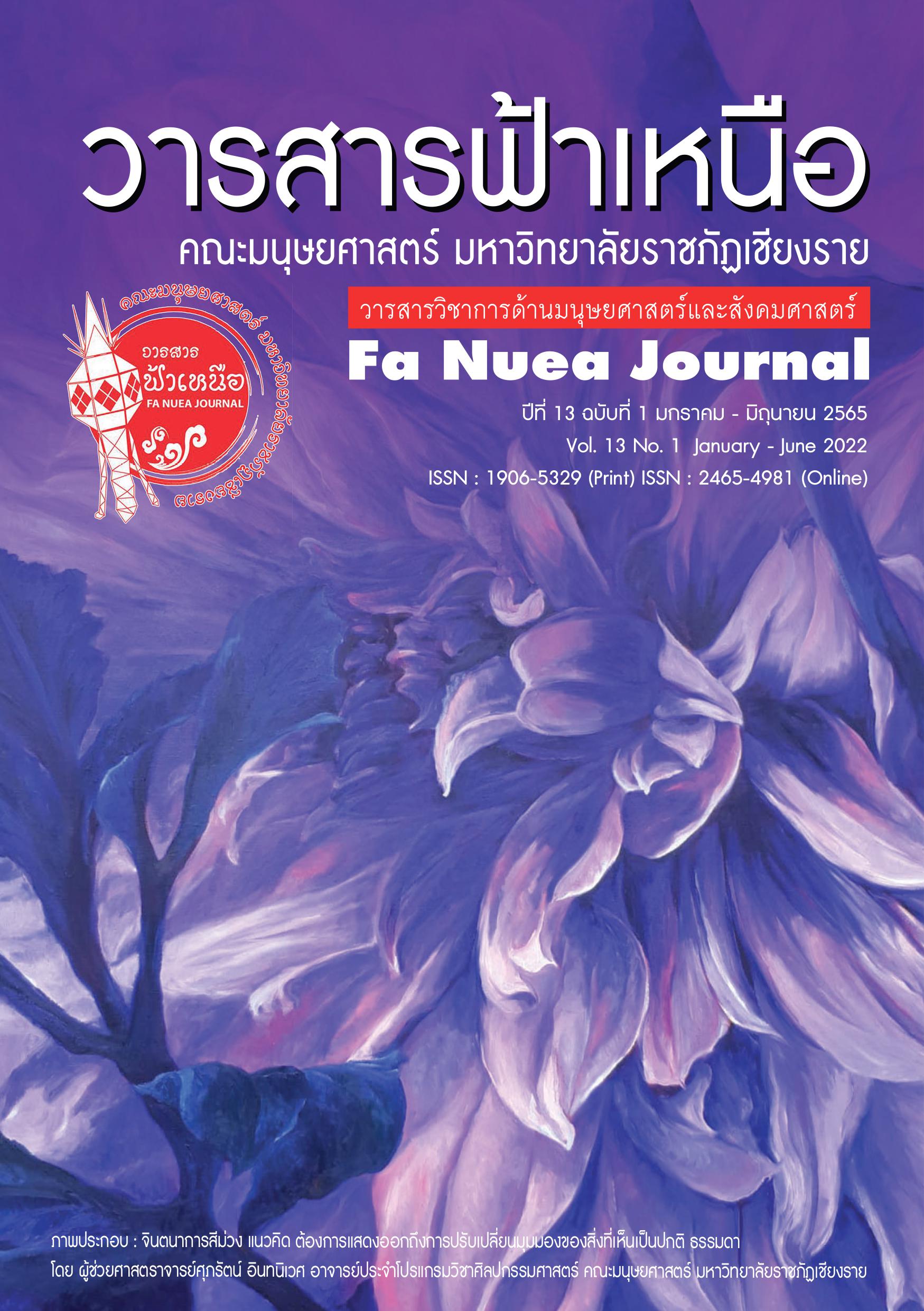A Study of Stakeholders Needs in 4th Year Internship Students of Bachelor of Arts, English Major, Chiang Rai Rajabhat University
Main Article Content
Abstract
The study aimed to 1) identify the stakeholder needs in fourthyear- internship students of Bachelor of Arts, English major, Chiang Rai Rajabhat University, 2) get comments and suggestions to improve the internship program of the Bachelor of Arts, English major, Chiang Rai Rajabhat. The study participants were the representatives from their workplaces: fourth-year-internship students and lecturers in the English curriculum. The instruments used in this study were questionnaires and interviews. The data were analyzed using the English for Specific Purposes (ESP) theory and Needs Analysis (NA).
The findings revealed that the students should be trained before starting the internship to improve confidence, self-esteem, decisionmaking, and leadership. In addition, English listening and speaking skills were the two most essential skills in workplaces. However, to improve the English curriculum, we should invite representatives from workplaces, alumni, and students to give suggestions and design the curriculum based on the needs of the labor market. The curriculum should focus on practicing the necessary skills for the internship and reducing other unnecessary activities.
Article Details

This work is licensed under a Creative Commons Attribution-NonCommercial-NoDerivatives 4.0 International License.
Articles, information, content, pictures, etc. which have been published in Fa Nuea Journal, are copyright of Fa Nuea Journal. If any person or party wishes to disseminate all or part of it or take any action must be referenced. Do not use for commercial purposes and do not modify (CC-BY-NC-ND). For further details, please access at Attribution-NonCommercial-NoDerivatives 4.0 International (CC BY-NC-ND 4.0)
References
ญาดา ชวาลกุล, นภกมล ชะนะ, และ ลัทธพร จันทองหลาง. (2561). ความต้องการของผู้มีส่วนได้ส่วนเสียต่อคุณลักษณะอันพึงประสงค์ของมหาบัณฑิตหลักสูตรสถาปัตยกรรมศาสตรมหาบัณฑิต สาขาวิชาการออกแบบอุตสาหกรรม.วารสารวิชาการ ศิลปะสถาปัตยกรรมศาสตร์ มหาวิทยาลัยนเรศวร, 9(1), 168-176.
ทัตทริยา เรือนคำ และ ยุทธศักดิ์ ชื่นใจชน. (2559). การสำรวจการรับรู้การเรียนภาษาอังกฤษเพื่อวัตถุประสงค์เฉพาะของวิทยาลัยพณิชยการบึงพระพิษณุโลก. วารสารมหาวิทยาลัยราชภัฏลำปาง, 5(2), 77-94.
อลิษา วิชัยดิษฐ์. (2557). การวิเคราะห์ความต้องการทางด้านการสื่อสารภาษาอังกฤษด้วยวาจาของมัคคุเทศก์ชาวไทย [วิทยานิพนธ์ปริญญามหาบัณฑิต, ไม่ได้ตีพิมพ์]. จุฬาลงกรณ์มหาวิทยาลัย.
Basturkmen, H. (2010). Developing Courses in English for Specific Purposes. Palgrave Macmillan.
Dudley-Evans, T., and St John, M. (1998). Developments in ESP: A Multi- Disciplinary Approach. Cambridge University Press.
Grant J. (2002). Learning needs assessment: assessing the need. BMJ, 324(7330), 156-159. https://doi.org/10.1136/bmj.324.7330.156 https://doi.org/10.1002/ev.20100
Hutchinson, T. and Waters, A. (1989). English for Specific Purposes. Cambridge University Press.
Khalid, A. (2016). Needs Assessment in ESP: A Review. CS Canada Studies in Literature and language, 12(6), 38-46. http://dx.doi.org/10.3968/8161
Mackay, R. and Mountford, A. (1978). English for Specific Purposes: A case Study Approach. Longman.
Munby, J. (1978). Communicative Syllabus Design. Cambridge University Press.
Nunan, D. (1999). Second language teaching & learning. Heinle & Heinle Publishers.
Richards, J. Needs analysis. (2001). Curriculum Development in Language Teaching. Cambridge University Press.
Robinson, P. (1991). ESP today. Prentice Hall International ltd.
Watkins, R., and Kavale, J. (2014). Needs: Defining what you are assessing. New Directions for Evaluation, 2014(144), 19-31.


